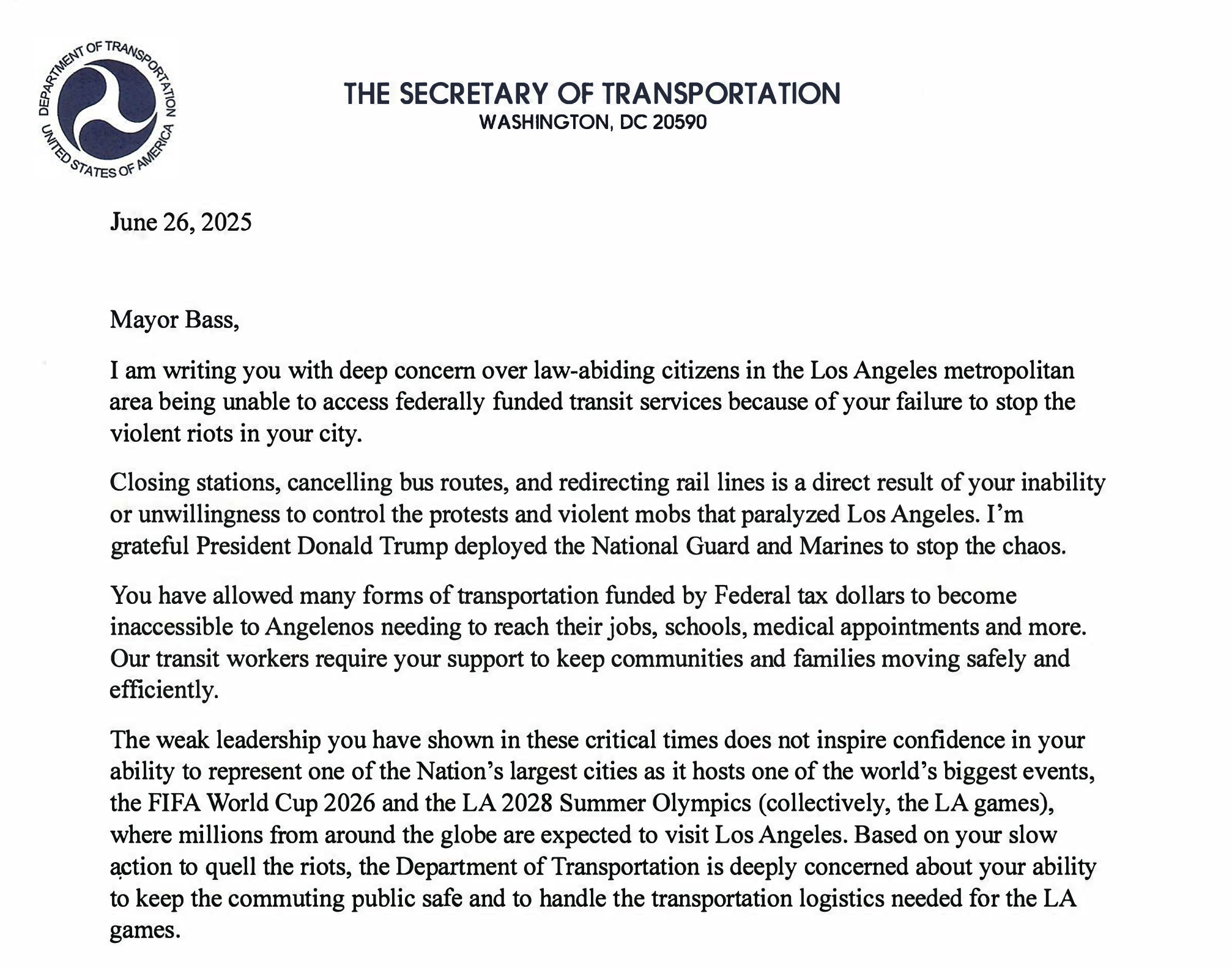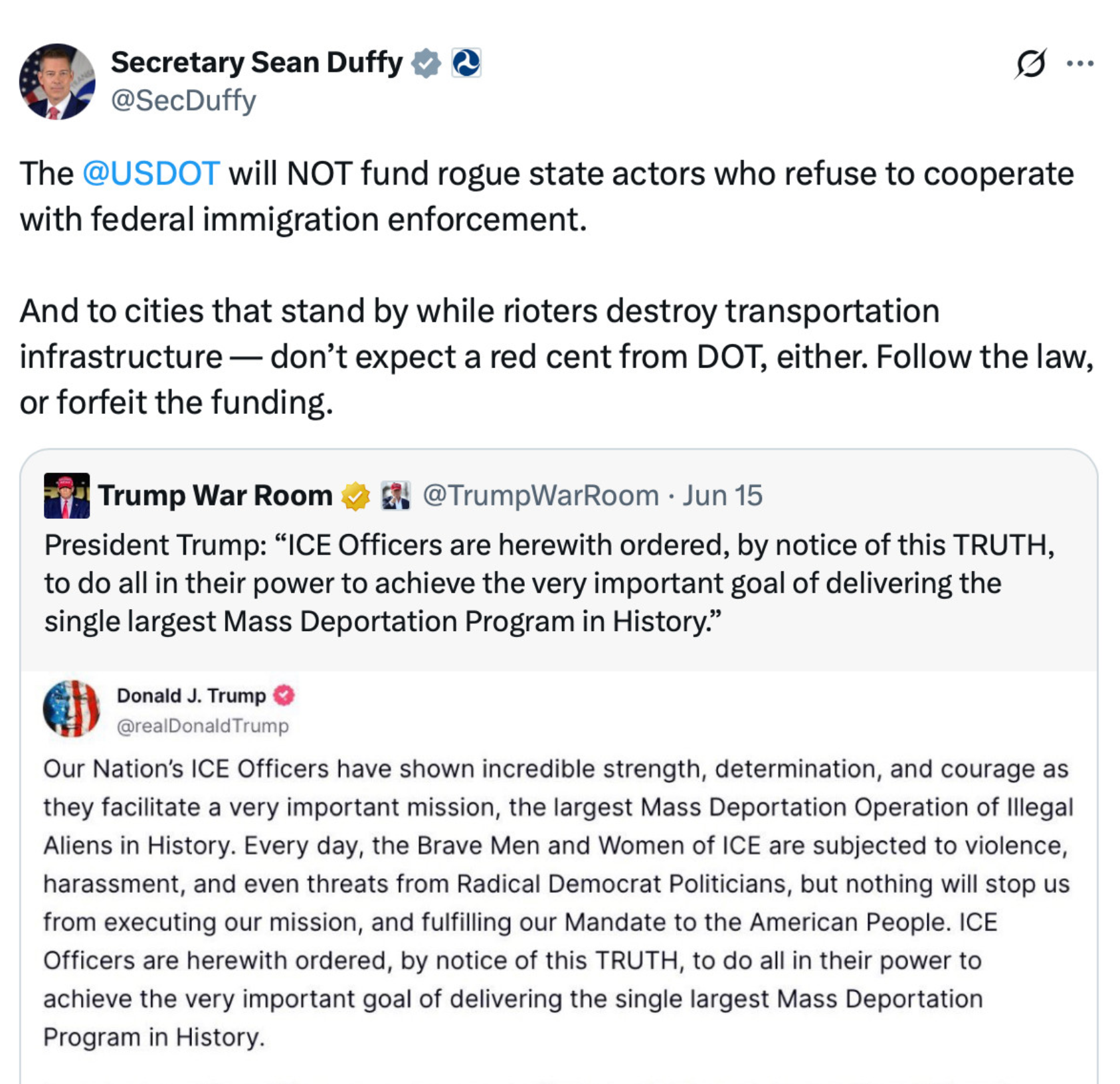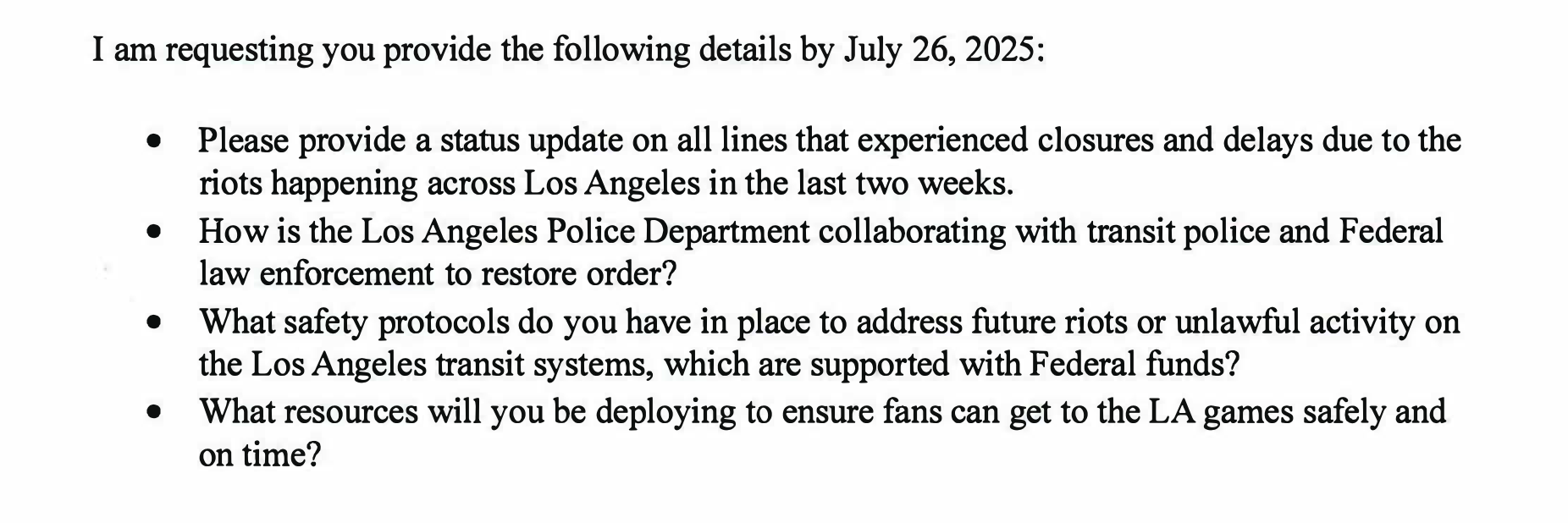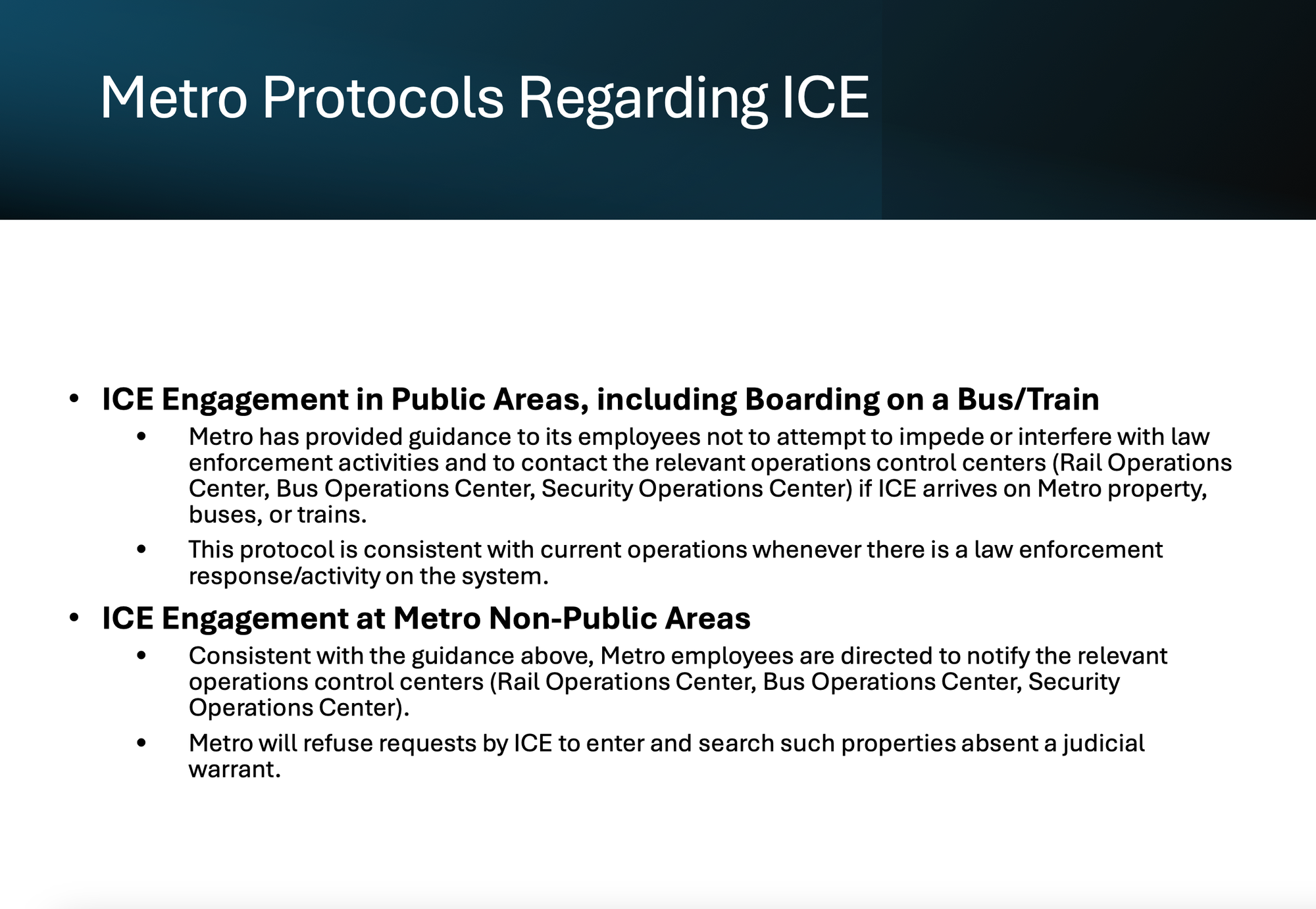Hey now, you're an All-Star
There are basketball-adjacent activations happening all weekend in more places than you might think
Sean Duffy's feigned hand-wringing on behalf of one federal department about the inconvenience of rerouting a few buses is simply revolting as another federal department is literally kidnapping people from bus stops

One would imagine that Transportation Secretary Sean Duffy has enough real-world problems to handle without having to invent new fake crises. But that's exactly what he did Thursday when he dispatched two letters to Los Angeles, one addressed to Mayor Karen Bass and one addressed to Metro CEO Stephanie Wiggins. In them, the Road Rules: All Stars cast member tries to infer that Metro's service disruptions during anti-ICE protests prove that LA is unfit to host upcoming megaevents. "Based on your slow action to quell the riots," he tells Bass, "the Department of Transportation is deeply concerned about your ability to keep the commuting public safe and to handle the transportation logistics needed for the LA games."
The commuting public is indeed in great danger — from the violent incursions of the Trump administration. Metro ridership is down, due to well-founded fears of being abducted at a transit station — or having a gun drawn on you for documenting said abduction. Sean Duffy's feigned hand-wringing on behalf of one federal department about the inconvenience of rerouting a few buses is simply revolting as another federal department is literally kidnapping people from bus stops.

Just a month ago, Duffy's correspondence with LA regarding pending megaevents had been cordial. On June 4, he sent an almost-cheery letter to now-outgoing Metro board chair Janice Hahn pledging his support: "We stand ready to help implement and offer technical assistance should the House and Senate advance legislation providing additional funding for mobility needs during the games."
But Duffy's demeanor quickly soured. On June 16, the same day Trump took to his own social network to declare an expansion of his mass deportation program — "by notice of this TRUTH" — Duffy tweeted his own warning to "rogue state actors" who refused to cooperate with ICE.

While the letter Duffy sent to Wiggins this week is similar to the letters Duffy sent to the heads of D.C. and New York City transit agencies earlier this year, demanding systems prove they are reducing fare evasion and violent crimes in order to access federal grants, the letter to Bass presents the June 16 tweet as a formal ultimatum — "follow the law, or forfeit the funding." At Thursday's Metro meeting, Bass — who is on the Metro board but not in charge of the system, a complicated jurisdictional formality a reality star cannot be expected to grasp — dismissed the letter as an attack on her while acknowledging that LA still needs federal assistance. And taken together, this is the most direct threat to Metro's megaevent funding so far.
Unfortunately, like the time Duffy came to LA to announce his sham high-speed rail audit — resulting in dozens of transit advocates, including one in a dinosaur costume, screaming at him in the Union Station ticket hall — he tucked a few good points into his screed of propaganda. As discussed in detail during Thursday's meeting, many Metro stations were closed during recent protests, stranding thousands of riders with no way to get home. It was absolutely unacceptable. As Hahn introduced a new motion calling for revised emergency protocols for large events and federal operations, she very accurately conveyed the experiences of many attendees of the No Kings rally on June 14. "They went to the Metro station, closed; went to the next one, closed. I heard people were walking miles to try to get out. These were people that were dispersing because they were ordered to disperse," she said. "I think the unintended consequences of shutting down those stations really harm the people who were peacefully protesting and trying to get out of there."
But the problems Hahn describes actually started hours before dispersal orders were supposedly issued 4:13 p.m. (I say supposedly because many reporters said they never heard them.) Riders I spoke to were encountering closed rail stations and buses that weren't taking passengers at noon. @metrolaalerts showed B line station closures as early as 11:24 a.m., when families filled the streets in a jubilant march that stretched for blocks and blocks. Some buses were already on detour, of course, but at 12:11 p.m., when I was boarding a bus leaving downtown, an alert noted that bus service was "shifting to outside of central business district," an astonishing eight hours before the curfew started — all shocking decisions that seemed completely out of character for Metro.
That's because the June 14 service changes weren't necessarily Metro's call — Metro's own officials said that LAPD ordered the closures of the stations.
The idea that LAPD can make the decision to alter transit operations certainly doesn't bode well for upcoming megaevents. And this has now set a troubling precedent for Duffy to exploit. Because the feds don't care about preserving bus service. They want a reason to crack down on inevitable future protests. Look at Duffy's homework list for Bass:

Once again, I very regrettably must admit that Duffy asks some questions I think we'd all like answered. How is LAPD collaborating with federal law enforcement? And how can we expect our transit system to change, security-wise, leading up to these games? Transit riders already know how much we're being asked to give up just to host these events. Security perimeters around venues. Temporary route changes. Public funding being directed to weapons-detection systems. Who has the final word on which Metro service is taken offline and when? Will we see entire stations closed, the same way the Hollywood and Highland B line station is unavailable during the Oscars, due to "safety" concerns?
Which is why transit advocates are asking for more clarity from Metro now. Last week, ACT-LA issued a coalition letter signed by 50 organizations demanding better protections for a ridership heavily impacted by federal operations. "The immigrant community in Los Angeles makes up a substantial portion of Metro’s ridership," Scarlett De Leon, executive director ACT-LA, told me. "That is why it's crucial for Metro to stand in solidarity and protect its riders from the presence of ICE agents terrorizing our county." Move LA executive director Eli Lipmen has also urged Metro for more precise guidance. "Move LA has been clear since the results of the November election: Metro needs a strategy to communicate with riders about the impact of federal policies on its riders, including service changes," he says. "We need a multilingual campaign to clarify that Metro is a sanctuary for all people, regardless of race, gender, identity, ability, status, and class."

In what could be fortuitous timing, Metro recently hired its own chief of police, Bill Scott, who started on Monday. He's creating a brand-new, in-house public safety department from scratch — something that Duffy took credit for, but had nothing to do with. After a vote at Thursday's meeting, Metro's over 300 transit ambassadors are also being brought in-house, boosting the profile of the popular unarmed response team right as Metro negotiates its stance with federal law enforcement ahead of all these events. As we've seen from the last month, if future public safety decisions don't take the concerns of Metro's core riders into account, it will decimate ridership even more. Earlier this month, soccer fans were calling rapid response hotlines when they spotted TSA officers wearing what appeared to be ICE-adjacent uniforms to patrol Metro's shuttles to the Club World Cup games last weekend in Pasadena. Does anyone really think after enduring the trauma of the last three weeks — not to mention all the trauma we have yet to endure — that LA's transit riders are going to voluntarily spend time on a hyper-militarized transportation system for the next three years?
The scariest part of Duffy's letter is not his threat to withhold federal funds. It's his attempt to paint Metro, like the city of LA, as ungovernable; in need of the already-federalized National Guard — or heck, maybe even the Marines, what else are they even doing? — to "secure" the environment. Last year, even without the nudge of an authoritarian federal government, New York Governor Kathy Hochul deployed the National Guard onto New York City subways to placate right-wing perceptions of rising crime. With megaevents looming, Duffy's correspondence is laying the groundwork for a federal takeover of our buses and trains. 🔥